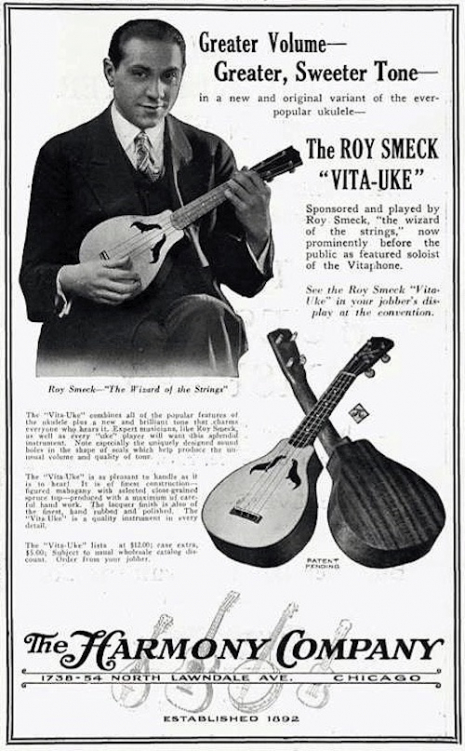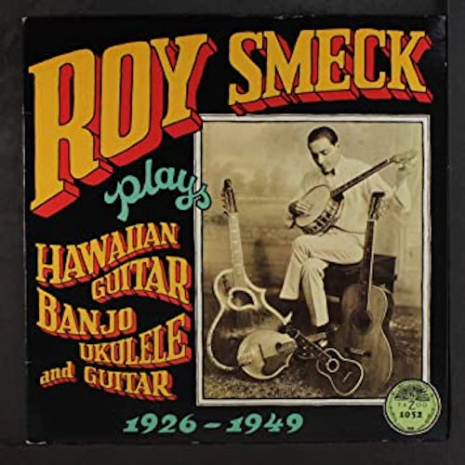
The great Roy Smeck surrounded by his instruments.
One of the many rumors passed around the Internet (imagine that!) concerns musician and ukulele player Roy Smeck, known as “The Wizard of the Strings.” It turns out that a lot of people seemed convinced that Smeck was actually Eddie Van Halen’s father and an innovator of “two-hand-tapping,” a method of playing a stringed instrument by tapping the strings with an object or your fingers. The technique has been traced back to the late 1700s, but as far as the popularization of two-hand-tapping, that honor belongs to Roy Smeck – a visionary ukulele player who rose to fame as one of vaudeville’s premier attractions. Smeck’s popularity was such that he was invited to play at President Franklin D. Roosevelt’s inauguration celebration in 1933. Getting back to the popular notion Smeck was EVH’s dad…after the devastating loss of Eddie earlier this month, keyboard warriors started sharing videos of Smeck tapping away on his uke with lightning speed, with the caption “this is Eddie Van Halen’s father.” I suppose it was an easy mistake to make, given the skill level Smeck possessed, and its eerie similarity to one of Eddie’s calling cards, his blink-and-you-missed-it guitar tapping wizardry.
Ed’s real father, Jan Van Halen, was, of course, a great musician in his own right and mentor to both Eddie and Alex Van Halen. He was also born twenty years after Smeck in 1920. To my knowledge, Eddie has never credited Smeck as a source of inspiration for his style. Though he has given the nod to another musician known for his finger-tapping innovations, Genesis guitarist Steve Hackett. In a 2012 interview with Ultimate Guitar, Hackett credited himself as being the “inventor of tapping on record,” which isn’t really true as guitarist Jimmie Webster was known for his tapping (or the sexy-sounding “touching”) technique, which you can hear on at least one recording, Webster’s Unabridged, from 1959.
But let’s get back to the talented Mr. Smeck, whose first 78 rpm recording came out in 1928, shall we?
Roy Smeck was born in 1900 in Pennsylvania. Starting at a young age, the future virtuoso would teach himself to play the guitar, steel guitar, banjo, octo-chorda (or “octachorda,” an eight-string steel guitar), jaw harp, harmonica, and his weapon of choice, the ukulele. While still in his early 20s, Smeck would become one of vaudeville’s most successful stars without uttering a single word during his energetic performances. Smeck preferred to dance for his fans while he frantically tapped on his uke. He’d also play it upside down with the same alarming speed and precision. His early exposure in vaudeville would lead to a myriad of incredible opportunities. His music would be featured along with the 1926 film Don Juan—the very first film to use Vitaphone sound-on-disc, which allowed both music and other sounds to be played in sync with the moving picture. His Pastimes, a short preceding Don Juan, featured an electrifying uke performance by Smeck would send his star soaring. The following year, he was approached by Jay Krause, the president of the largest string instrument manufacturer in the U.S. (at the time), the Harmony Company of Chicago. In a 1984 interview with an 84-year-old Smeck, he recalled Krause’s proposal that Smeck “produce” a Hawaiian guitar, uke, banjo, and guitar exclusively for Harmony. Smeck’s bosses at Warner objected to the use of the word Vitaphone for the line. Smeck and Kraus changed directions slightly by naming the various instruments as “The Roy Smeck Vita-Uke,” The Roy Smeck Vita-Guitar,” etc.

None of the instruments in Smeck’s Vita line of instruments were crafted by the musician, though they contained some of the master uke player’s preferred modifications, such as the graceful sound holes at the base of the Vita-Uke neck. Though it’s important to note, the shape of the holes, which Krause would describe as “seal-shaped,” also were not designed by Smeck. In fact, it’s unclear whose idea it was. What is known is that when Harmony presented Smeck with the array of instruments they were creating for his namesake gear, he would choose the one he felt had the best “action.” Amen to that, Mr. Smeck. Harmony’s Smeck line was so successful, it gave birth to a sister line—Supertone—for Sears and Roebuck. During this time, Smeck was traveling around the country promoting the Vita line performing live at record shops, theaters as well as showing up to local uke contests where he would razzle-dazzle onlookers with his remarkable dexterity. During his long career, Smeck would release 500 recordings, a huge collection of instructional manuals, song books and more. In 1976, the sadly now defunct record label Yazoo released a vinyl retrospective of Smeck’s work, Roy Smeck-Plays Hawaiian Guitar, Banjo, Ukulele, And Guitar 1926-1949 with cover artwork by Robert Crumb. There is also a wonderful Academy Award-nominated documentary short on Roy Smeck, Wizard of the Strings (1985), that is well worth your time if this is the kind of history you like learning about. At the very least, you can now politely shut down the next person who tries to pass Smeck off as Eddie Van Halen’s dad. Lastly, but certainly not least, the legendary Leonard Cohen was a huge fan of Roy Smeck and met the Wizard of the Strings when he was just ten and an aspiring, enthusiastic ukulele-player himself.
Let’s end this very-fretty history lesson with some footage of Roy Smeck shredding his Ukelele to bits before shredding something to bits was a thing.

Robert Crumb’s cover of Yazoo’s 1976 vinyl retrospective of Roy Smeck.
‘His Pastimes’ (1926).
More footage of Smeck from a film. Amusingly, the individual who posted this called the two-minute clip an ‘Eddie Van Halen training video.’
‘Wizard of the Strings’ (1985).
Previously on Dangerous Minds:
Rat Salad: Eddie Van Halen’s riffy 1994 collaboration with Black Sabbath
Slash vs. Eddie Van Halen: This really happened in Ohio…
The ultimate hipster-takedown song: ‘F*ck off with your ukulele orchestra’
Ukulele orchestra perform ‘Anarchy In The UK’